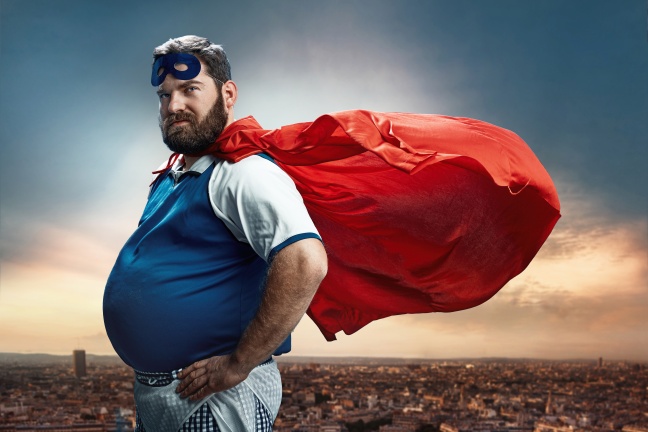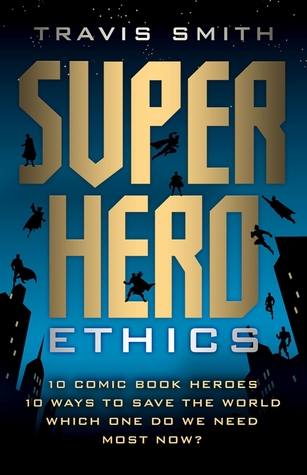Interview with Travis Smith,
Author of Superhero Ethics
About the Author:
Travis Smith is the author of Superhero Ethics (Templeton Press). He is an associate professor at Concordia University where he teaches political philosophy. He remembers seeing Superman: The Movie with his dad on the big screen at the age of five. He has been collecting comic books since he bought a copy ofUncanny X-Men #207 in 1986 with his allowance from the racks at Stan’s Variety. For over thirty years, Travis has made a weekly stop at his local comic shop on the day new comics are released to pick up the books on his pull list–from Comic Connection in Hamilton, Ontario, while he attended McMaster University, to the Million Year Picnic in Cambridge, Massachusetts, as he earned his doctorate at Harvard University, to Major Comics in Montreal, Quebec, the city where he now teaches Hobbes, Tocqueville, Plato and Aristotle by day, and fights crime by night.
For more information, please visit www.templetonpress.org/books/superhero- ethics

How would you define the notion of a “Super” hero as opposed to
other heroes in literature?
I use the term superhero conventionally as pertaining to the kinds of costumed characters labeled that way in the DC and Marvel universes and in similar stories. Most of them have superpowers, but not all of them. I don’t think they’re inherently more super than other fictional heroes lacking those costumes and powers. In fact, for the purposes of Superhero Ethics, I downplay the “super” part of superhero—and even the “hero” part, too, to a fair degree. I look for ways these characters’ personalities, abilities, and activities can be read metaphorically so as to resemble the lives of ordinary human beings and the challenges we face. Maybe counterintuitively, I think that their being fantastical makes it easier to apply them analogously to our experiences and situations. It is often hard and sometimes objectionable to compare our own problems with the real-world difficulties confronted by other actual people—or even characters featured in more realistic fiction.

What is it in our nature that draws us to superheroes?
In democratic society, we emphasize equality—the ways we’re equal to each other, and the ways we say we should be. But we also want to be happier than we are, better than we are. We look for or create models of excellence that are worthy of admiration and emulation. We do so on our own terms, of course. We like superheroes who make sacrifices on behalf of anyone and try to save everyone. We like it when we can imagine that any of us are potentially like any of them. Superheroes also remind us of the importance of courage in overcoming hardships and pain. I think courage tends to be neglected in the way we’re raised today, since we’re so concerned with minimizing suffering and making everything safe. So, superheroes speak to some parts of the human condition that are neglected or suppressed in our public ethos but ineradicably part of us, and therefore of perennial relevance to ethics.

Do you have a personal favorite?
Captain Marvel—the Carol Danvers version of Captain Marvel, originally known as Ms. Marvel—is my favorite superhero. She’s not featured in the book because I decided to focus on popular, well-known characters who have been featured prominently in recent films. But she is the first female character to star in a solo self-titled movie set within the Marvel Cinematic Universe, to be released in early 2019, and I’m excited about that.
“I think that we all do heroic things, but hero is not a noun, it’s a verb.” – Robert Downey Jr.
Describe the hardest chapter to write and why it was so difficult.
My chapter on Captain America and Mister Fantastic was the hardest to write because I use them to contrast the two models of the best life for human beings according to the classical tradition: the active life and the contemplative life. And I’m aware of how distant my own life is to any model of either ideal. I try to approach those characters in good part by asking: In which ways does modern society hamper or compromise any attempt to realize these conceptions of the best life—even among those individuals who come closest to approximating them?

Name some characters that didn’t make the cut for this book.
There are so many! Because I made the decision to focus on characters well-known presently to the general public, I didn’t write a book about my favorite characters. That would include not only Captain Marvel but Booster Gold, the new Ms. Marvel, Squirrel Girl, and Power Girl. I didn’t include the very popular Deadpool or Harley Quinn because they mock the very idea that superheroes should be good role models. I also wanted the characters I chose to be distinctive with respect to the ethical concerns they represent.
So, Black Widow wasn’t examined on account of embodying the maxim “don’t be what they made you,” which makes her too similar to the better-known Wolverine. Black Panther’s feature film came out only as I was submitting my final manuscript, so he wasn’t treated at length—although in the book I hint that he represents a happier version of the active life than Captain America does. I most regret leaving out Wonder Woman, but I mention that she is more divine than Superman, and I argue that Superman is already too divine for us.
The only character good enough to contrast with Wonder Woman is Silver Surfer and most of us are glad to have forgotten the movie that featured him. Personally, I prefer Supergirl to Superman—she represents the challenge of living up to an impossible standard already set by someone else to whom you’re inextricably tied. That’s a situation a lot of us are familiar with. But I decided not to use characters whose origins are directly dependent on another character’s story. I think if I were writing the book just five years from now there would be so many more popular, well-known characters to choose from.
A mere ten years ago, Iron Man was a relatively obscure character. Most moviegoers hardly knew anything about Tony Stark until Robert Downey, Jr. made him so endearing. Doesn’t that seem crazy now?

Thanks Travis! Stay tuned for part two of the interview…
Whether in comic books or on movie screens, superhero stories are where many people first encounter questions about how they should conduct their lives.
Although these outlandish figures—in their capes, masks, and tights, with their unbelievable origins and preternatural powers—are often dismissed as juvenile amusements, they really are profound metaphors for different approaches to shaping one’s character and facing the challenges of life.
But, given the choice, which superhero should we follow today? Who is most worthy of our admiration? Whose goals are most noble? Whose ethics should we strive to emulate?
To decide, Travis Smith takes ten top superheroes and pits them one against another, chapter by chapter. The hero who better exemplifies how we ought to live advances to the final round. By the end of the book, a single superhero emerges victorious and is crowned most exemplary for our times.
How, then, shall we live?
-
- How can we overcome our beastly nature and preserve our humanity? (The Hulk vs. Wolverine)
-
- How far can we rely on our willpower and imagination to improve the human condition? (Iron Man vs. Green Lantern)
-
- What limits must we observe when protecting our neighborhood from crime and corruption? (Batman vs. Spider-Man)
-
- Will the pursuit of an active life or a contemplative life bring us true fulfillment? (Captain America vs. Mr. Fantastic)
-
- Should we put our faith in proven tradition or in modern progress to achieve a harmonious society? (Thor vs. Superman)
Using superheroes to bring into focus these timeless themes of the human condition, Smith takes us on an adventure as fantastic as any you’ll find on a splash page or the silver screen—an intellectual adventure filled with surprising insights, unexpected twists and turns, and a daring climax you’ll be thinking about long after it’s over.
Amazon | Goodreads | Templeton Press



Apppreciate this blog post
LikeLiked by 1 person